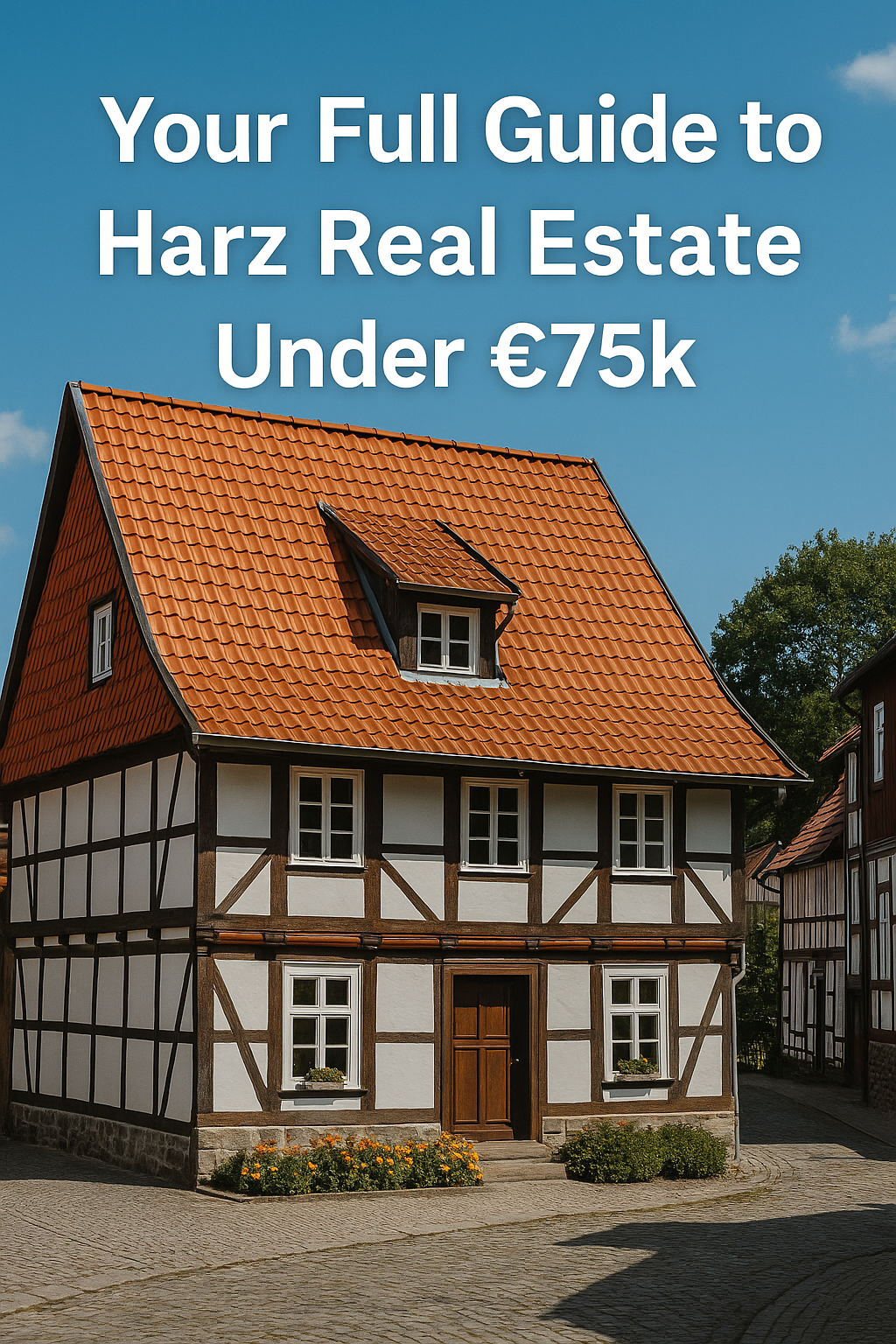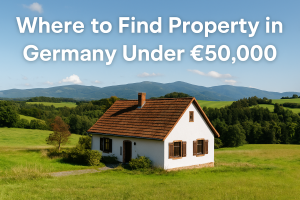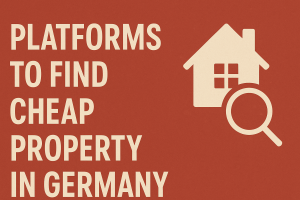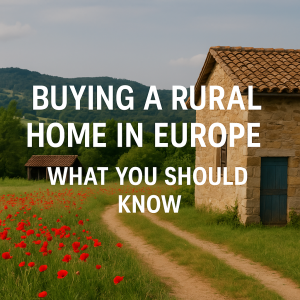Section 1: Why the Harz Region Is Gaining Attention
Peace, Nature and Affordable Property
The Harz region in central Germany is quietly becoming one of the most attractive places to buy real estate for under €75,000. Surrounded by forests, lakes and hills, this area offers buyers something that is hard to find elsewhere in Europe: space, peace and real value for money. Whether you are looking for a weekend home, a rental property or a permanent move, the Harz is worth exploring in 2025.
A Region Full of Character and Simplicity
The Harz is home to charming towns filled with timber-frame houses, traditional markets and a slower pace of life. These places are not only beautiful but also practical. Most towns offer supermarkets, regular bus or train services and decent internet. You will find local communities that are welcoming and a way of life that focuses on simplicity and balance.
Steady Tourism Without Overcrowding
While the Harz is not as crowded as southern Germany or large coastal regions, there are still towns that attract regular visitors. One example is Hahnenklee, a small spa village in the district of Goslar. It offers ski lifts, hiking trails and summer attractions like the mountain toboggan run. Based on my own experience, it is possible to rent out an affordable apartment here consistently throughout the year.
That makes areas like Hahnenklee interesting for people who want to generate income without dealing with over-tourism. Visitors come for nature, peace and wellness. They support local businesses, but the area still feels relaxed and liveable.
A Property Market With Real Options
In the Harz, you can still find solid homes at reasonable prices. Renovated apartments often sell for €40,000 to €70,000. In smaller towns, it is even possible to buy cottages or renovation projects for under €30,000 if you are ready to do some work. These homes offer potential for part-time use, holiday rental or full relocation.
If you are looking for a lifestyle change without stress or financial pressure, the Harz region offers a rare combination of value and quality of life in 2025.
Section 2: Is It Really Possible to Buy for Under €75,000?
Buying a home in the Harz region for under €75,000 is still possible in 2025. But like any property search, your success depends on a few things. You need to know where to look, be flexible about what kind of home you want and understand how much work you are willing to do. You will not get a luxury villa at this price, but you can still find real homes with good long-term potential. There are also some old independend houses that after a renovation will look like a villa.
What Kind of Properties Are Still Available
In many towns across the Harz, especially in less busy areas, one or two bedroom apartments are still available for prices between €35,000 and €65,000. These may be older units in small buildings, often with balconies or cellars. Some need small upgrades like a new heater or fresh paint. Others are already furnished and ready to live in or rent out.
Small houses are also within reach. In rural towns or at the edge of larger villages, you can find traditional homes for sale under €75,000. These houses may need more work, but they come with extra space, gardens or even small outbuildings. They are perfect if you want a bit more privacy and are open to basic renovation projects.
Where to Find the Best Deals
The most attractive offers are often not listed on large international websites. Instead, you will likely find better prices through local real estate brokers. These agents know the area and may have listings that are not widely advertised. They usually charge a fee of about three to five percent, but they can help you with paperwork and negotiations.
Another place to search is Kleinanzeigen, Germany’s popular private listing site. Here, you can find homes listed directly by the owners. You will often see better prices, but you must do more work yourself, including checking if the house is legally registered.
You can also discover great opportunities by visiting towns in person and speaking with locals. Many properties are sold by older owners or families who prefer not to deal with online listings. By connecting with people on the ground, you may find homes that are not advertised anywhere.
Why This Region Remains Affordable
The Harz did not experience a huge real estate boom like other areas in Germany. Some towns even have declining populations, which keeps property prices low. That said, the region is stable, connected and offers long-term potential, especially in areas that attract tourists or remote workers.
Section 3: What to Watch Out for When Buying in Germany
The Legal Process Works Differently
Buying property in Germany is safe and clearly regulated, but the process may feel unfamiliar if you are from another country. Every sale must go through a notary who prepares the official contract, oversees the signing and manages the transfer of ownership in the land registry. The notary is neutral and does not represent the buyer or the seller. That means you will need to understand every detail yourself or bring your own legal support.
Contracts are written in German and often explained only in German during the notary meeting. This is why many foreign buyers choose to bring a translator or work with a local lawyer who knows the system. It is the best way to avoid misunderstandings or missed details.
Always Check Ownership and Debts
Before you agree to anything, ask for a copy of the land registry document known as the “Grundbuch.” This shows the legal owner, the size and type of the land and any debts or restrictions linked to the property. It is essential to confirm there are no loans, shared use rights or boundary disputes before you buy.
For older homes, especially in small towns, ask if there were any changes made without official approval. Extra buildings, roof conversions or new terraces sometimes do not appear in the records. These might not stop you from using the house, but they could affect insurance or future value.
What to Watch for When Buying Apartments
If you are buying an apartment in a shared building, you are not only buying your flat. You are also joining the community of owners, known in Germany as the “Eigentümergemeinschaft.” This group shares the costs of things like the roof, heating systems, stairwells and outside walls.
It is important to check two things before you buy: first, that the community has enough money saved in the shared budget, and second, that there are no major repairs coming up soon. Ask for the most recent financial statement and a copy of the meeting minutes from the last owners’ gathering. These documents will tell you if the building is well-managed or facing big costs in the near future.
Some buyers are surprised by extra payments after buying because of poor planning or unpaid contributions. A well-run building should have a clear plan and enough reserve money to avoid sudden fees.
Be Aware of Extra Costs
In addition to the purchase price, you will pay several extra costs. These usually include:
- Property transfer tax, between 3.5 and 6.5 percent depending on the region
- Notary and land registration fees, usually about 2 percent
- Agent or broker fee, if used, often around 3 to 5 percent plus VAT
These costs can add up quickly. On a €70,000 home, expect to spend an extra €6,000 to €9,000 in total.
Paperwork and Patience
Germany is known for being organized, but the paperwork can be detailed. You may need a local bank account, a German tax number and help with signing documents. Most of this will be in German and often handled through printed forms rather than online systems. Planning ahead and asking the right questions will make the process smoother.
Section 4: Popular Towns and Villages With Budget Listings
A Region With Many Small Towns to Explore
The Harz region is full of small towns that still offer properties for under €75,000. While many buyers only look at cities, this area stands out for its peaceful atmosphere, clean air and historical charm. From old spa towns to sleepy forest villages, the options are varied and surprisingly affordable in 2025.
Where I Focus My Search
From my own experience, I prefer towns located in the Lower Saxony part of the Harz, the region that was once part of West Germany. These towns are often better maintained and have more stable local services. The roads, buildings and general upkeep tend to be in good condition. I have also found that small apartments in these areas can be rented out consistently during the year, especially in tourist-friendly towns with hiking routes or winter sports.
That said, your choice should depend on what matters most to you. Some people want total privacy. Others want a house with a garden. Some are focused on rental income, while others want a place to enjoy with family. The Harz has something for almost every goal.
Towns Worth Exploring
Bad Grund is a calm spa town with a historic center. Prices are often under €60,000 for a small flat.
Clausthal-Zellerfeld has a university, a mix of young and older residents and steady demand for rentals.
Hahnenklee is small but lively year-round. Based on my experience, flats here rent out well to tourists.
Wildemann is peaceful and often has houses listed under €40,000 for those open to light renovation.
Braunlage is a bit more active, with ski lifts and tourist interest. Good for long-term value, though prices may be slightly higher.
Always Visit Before You Decide
The Harz looks great in photos, but every town has its own feeling. Some places are very quiet, which is ideal for some but not for others. If you are serious about buying, it helps to visit and stay a few days. Walk around, speak to residents and check what is available in your price range.
Also ask what kind of life you want. Do you prefer nature or convenience? Can you handle remote living, or do you want a town with a shop and a café nearby? Your answers will lead you to the right place.
Section 5: Living in the Harz as a Foreigner
Renting out your home in Germany is still possible in 2025, but the rules depend on where the property is located and what kind of rental you plan to offer. In most parts of the Harz, especially in rural towns and villages, the laws are less strict than in big cities like Berlin or Hamburg. That makes the Harz a good option for people who want to earn a bit of income from short stays or even long-term tenants.
In tourist areas short-term rentals through platforms like Airbnb or Booking are still allowed, but some towns now require a registration number or a permit. It is smart to check with the local municipality (Gemeinde) before you list anything. Some areas also require you to register for local tourism tax if guests stay less than three months.
Apartments May Face Extra Rules
If you plan to rent out an apartment in a shared building, keep in mind that the owners’ association (Eigentümergemeinschaft) may set limits. Some buildings do not allow holiday rentals at all. Others may ask for extra maintenance payments or set rules about how many weeks per year the property can be rented. Before you buy, check the building regulations and the minutes from recent owner meetings.
This is why many buyers prefer detached homes or properties without shared walls. These are usually easier to rent out without restrictions and give you more freedom to decorate, renovate or use the space as you wish.
My Personal Experience
Based on my own experience, small apartments in the Harz region of Lower Saxony can still be rented out regularly throughout the year, especially in tourist towns that attract hikers, cyclists and winter visitors. Hahnenklee, for example, welcomes around 450,000 overnight stays annually, which helps keep the market active even outside of summer.
While the income may not be huge, it can easily cover costs and sometimes bring in a small profit if the home is well maintained and in the right location. Keep in mind that many guests prefer clean, functional apartments with free parking and internet. Extras like a balcony or good views help as well.
Think Long Term
If you want to buy mainly for rental income, make sure the area has a solid visitor base and enough services. Also check the competition. Some towns have too many rentals, which can make it harder to fill your calendar. Others have a loyal base of repeat guests, which is ideal.
Also remember that short-term rental income is taxable in Germany, even if you live abroad. You may need to register for a tax number and submit simple reports each year. A local tax advisor can help with this if needed.
Section 6: Is Buying in the Harz Right for You?
Buying a property in the Harz in 2025 is not for everyone, but for the right person it can be a smart and rewarding choice. The region offers a mix of charm, value and opportunity that is getting harder to find elsewhere in Germany or Europe.
The prices are still low, especially compared to larger tourist regions or the major cities. In many towns, you can still find apartments under €75,000 that are legal, liveable and even rentable. That makes the Harz one of the last areas in Western Europe where everyday people can afford to buy without taking on major debt.
From my own experience, towns in Lower Saxony within the Harz region are especially attractive. They are well maintained and have decent infrastructure, and many offer tourism all year round. That combination makes it easier to rent out a small apartment, even outside of the peak holiday season. But that is my personal choice. Others may prefer more isolated towns, larger homes or simply a quiet retreat with no guests.
Final toughts
Still, it is not all perfect. You need to do your research, understand the legal steps and be ready to take care of paperwork in German. If you buy an apartment, you also need to know the rules of the building. If you rent it out, you must collect forms from guests, pay local taxes and follow town-specific rules. That can be a lot for someone who just wants a weekend house in the woods.
Most of all, it depends on your goals. If you want to live full-time, be sure the area has what you need. Or you want rental income, choose a location with tourism flow and solid reviews. If you just want a quiet place for summer or winter escapes, the options are wide and varied. But none of that works unless you take your time, visit the towns and talk to people who live there.
If you are considering a move, feel free to join the discussion on our Affordable Bricks community forum. Ask your questions, share your thoughts and learn from others who are also looking for budget homes across Europe.
In the end, buying in the Harz is a personal choice. It is not about fast profits. It is about finding a place that suits your life, your budget and your idea of freedom.
Join the Conversation
Looking for advice or want to share your experience? Our community forum is the place to ask questions, learn from others, and connect with people across Europe who are also searching for affordable property. Whether it’s about financing, notaries, or renovation tips. You’re not alone. Your story might help someone else too!



